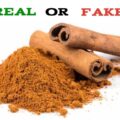What is cinnamon?
Cinnamon is a favorite household spice, and has been used around the world for centuries. Once traded as currency, this spice has a pleasant flavor and warm smell that has made it popular in cooking, particularly in baking and curries. The spice comes from the inner bark of a small evergreen tree. The bark is peeled and laid in the sun to dry, where it curls up into rolls known as cinnamon sticks. Cinnamon is also available in powdered form.
People have used cinnamon since 2000 BC in Ancient Egypt, where they regarded it highly. In medieval times, doctors used it to treat conditions such as coughing, arthritis, and sore throats. It is now the second most popular spice, after black pepper, in the United States and Europe. As a spice, cinnamon is available in powder form or whole, as pieces of bark. People can also use cinnamon essential oil and supplements. There are two main types of cinnamon: cassia and Ceylon. The two have different nutritional profiles.
Some studies have suggested that the compounds in cinnamon have antioxidant, anti-inflammatory, anti-diabetic, and anti-microbial properties and that they might offer protection from cancer and cardiovascular disease, among other conditions. However, more evidence is needed to confirm cinnamon’s benefits.
How is cinnamon used ?
Cinnamon is generally safe to use in small amounts as a spice. It’s linked to many impressive health benefits. However, eating too much may cause potentially dangerous side effects. This mostly applies to Cassia cinnamon because it’s a rich source of coumarin. Conversely, Ceylon cinnamon contains only trace amounts of coumarin. The tolerable daily intake for coumarin is 0.05 mg per pound (0.1 mg per kg) of body weight. This is how much coumarin you can eat in a day without the risk of side effects.
This equates up to 8 mg of coumarin per day for an adult weighing 178 pounds (81 kilograms). For reference, the amount of coumarin in 1 teaspoon (2.5 grams) of ground Cassia cinnamon ranges from 7 to 18 mg. Keep in mind that children may tolerate even less.
Vaginal tightening
The importance of sex in a relationship should never be underestimated. It allows a couple to connect on a deeper and more intimate level; both physically and emotionally. Eliminating this from the equation will undoubtedly put a great deal of pressure and strain on any couple. Vaginal ‘looseness’ should never be viewed as simply another by-product of age. There’s no way of hiding it, but there are certainly ways to treat it.
Understanding how to tighten vaginal walls is extremely important because of the range of health benefits it brings. Vaginal tightening can help prevent battle stress incontinence and even help reduce the number of infections from things like bacterial vaginosis. Treatments for vaginal tightening may also help renew your sex life. Working on your pelvic floor and incorporating additional treatments into your regime can help limit vaginal atrophy – where the vaginal walls become dry and irritated – improve lubrication and increase sexual pleasure.
What Causes Vaginal Looseness?
Vaginal looseness happens when there’s immense stress placed on the vaginal walls causing the vaginal canal to lose some of its natural elasticity. The primary causes of vaginal looseness are:
Age: As our bodies age, the decrease in estrogen production means the vagina becomes naturally less elastic and constricts.
Menopause: As with the peri-menopause phase – the 5–10-year gradual change in hormones before menopause begins – and the menopause itself, you’ll find your pelvic floor needs some extra attention. The abrupt change in hormones can weaken the pelvic floor and the vaginal canal while causing additional symptoms like bladder and bowel control issues.
Pregnancy and Childbirth: When you’re pregnant and giving birth, your body is pushed to its limit to accommodate a growing child. During childbirth, the muscles along the vaginal canal expand to make room for the baby. This, unsurprisingly, weakens the walls and results in a ‘looser’ vagina.
Does Cinnamon Tighten The Vagina?
There is NO scientific or anecdotal evidence indicating that cinnamon or cinnamon-based products can tighten the vagina. Studies indicate that cinnamon has the power to destroy Candida albicans, the fungus which causes most vaginal yeast infections. Vaginal yeast infections are very common, happening to over 1 million women in the United States each year.
Cinnamon can also fight many types of bacteria that make people sick, including salmonella, E. coli, and staph. If left untreated, staph infection can be deadly. Rarely, staph infections are resistant to the antibiotics commonly used to treat them. This infection, called methicillin-resistant Staphylococcus aureus (MRSA), cause severe infection and death.
When it comes to the vagina, there are a lot of myths and misconceptions. Some people, for example, believe that vaginas can lose their elasticity and become loose forever. That’s not actually true, though.
Your vagina is elastic. This means it can stretch to accommodate things coming in (think: a penis or sex toy) or going out (think: a baby). But it won’t take long for your vagina to snap back to its previous shape.
Your vagina may become slightly looser as you age or have children, but overall, the muscles expand and retract just like an accordion or a rubber band.
What are the side effects of cinnamon?
While cinnamon is safe to eat in small to moderate amounts, eating too much may cause health problems because it contains high amounts of a compound called coumarin. The side effects of cinnamon may include the following:
Cause Liver Damage: Several studies have found that eating too much coumarin may cause liver toxicity and damage. For example, a 73-year-old woman developed a sudden liver infection causing liver damage after taking cinnamon supplements for only 1 week.
Increase the Risk of Cancer: Studies have shown that eating too much coumarin, which is abundant in Cassia cinnamon, may increase the risk of certain cancers. The way in which coumarin may cause tumors is unclear. However, some scientists believe that coumarin causes DNA damage over time, increasing the risk of cancer.
Cause Mouth Sores: Some people have experienced mouth sores from using products that contain cinnamon flavoring agents. Cinnamon contains cinnamaldehyde, a compound that may trigger an allergic reaction when consumed in large amounts. Small amounts of the spice don’t seem to cause this reaction, as saliva prevents chemicals from staying in contact with the mouth for too long.
Cause Low Blood Sugar: Cinnamon is well-known for its ability to lower blood sugar. Studies have found that the spice can mimic the effects of insulin, a hormone that helps remove sugar from the blood. This is called hypoglycemia. It can lead to tiredness, dizziness, and possibly fainting.
Cause Breathing Problems: Eating too much ground cinnamon in a single sitting may cause breathing problems. This is because the spice has a fine texture that can make it easy to inhale. People with asthma or other medical conditions that affect breathing need to be especially careful of accidentally inhaling cinnamon, as they are more likely to experience trouble breathing.
Interact with Certain Medications: If you’re taking medications that may affect your liver, such as paracetamol, acetaminophen, and statins, excessive intake of cinnamon may increase the chance of liver damage.
ALSO SEE: Does Sitting On Hot Water Tighten The Vagina






